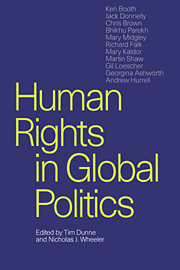Book contents
- Frontmatter
- Contents
- List of contributors
- Preface and acknowledgements
- Introduction: human rights and the fifty years' crisis
- I Theories of human rights
- 1 Three tyrannies
- 2 The social construction of international human rights
- 3 Universal human rights: a critique
- 4 Non-ethnocentric universalism
- 5 Towards an ethic of global responsibility
- II The practices of human wrongs
- Index
3 - Universal human rights: a critique
Published online by Cambridge University Press: 05 June 2012
- Frontmatter
- Contents
- List of contributors
- Preface and acknowledgements
- Introduction: human rights and the fifty years' crisis
- I Theories of human rights
- 1 Three tyrannies
- 2 The social construction of international human rights
- 3 Universal human rights: a critique
- 4 Non-ethnocentric universalism
- 5 Towards an ethic of global responsibility
- II The practices of human wrongs
- Index
Summary
Virtually everything encompassed by the notion of ‘human rights’ is the subject of controversy. The controversies of relevance here are not those associated with enforcing compliance to human rights law, or with the execution of foreign policy options allegedly dedicated to the protection of human rights – these are important topics but they are not the concern of this chapter. Instead its theme emerges from the fact that the idea that individuals have, or should have, ‘rights’ is itself contentious, and the idea that rights could be attached to individuals by virtue solely of their common humanity is particularly subject to penetrating criticism. That such criticisms exist is a commonplace, but what is less well established in the international relations discourse on human rights is the fact that virtually all the current arguments have a very long pedigree – indeed, are associated with positions that have been argued over for centuries within the canon of Western political theory. It is particularly important to stress that this is so, because so much of the current discourse on rights assumes that the conceptual problems thrown up by the notion are peculiarly the product of particular late-twentieth-century problems – the so-called problem of cultural relativism which, allegedly, has been generated by the globalisation of the international system.
- Type
- Chapter
- Information
- Human Rights in Global Politics , pp. 103 - 127Publisher: Cambridge University PressPrint publication year: 1999
- 43
- Cited by



